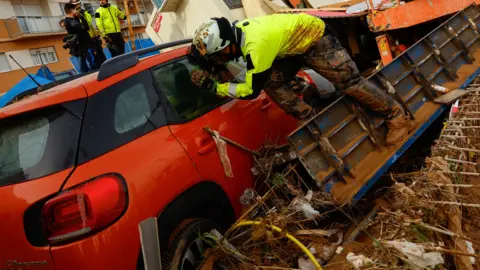Spain floods: The search for survivors continues

Emergency teams in Spain are continuing their efforts to find dozens of people still missing in the worst flood disaster in generations.
More than 200 people are known to have died, with most of the deaths occurring in the Valencia region, but the death toll is expected to rise.
The floods destroyed bridges and covered towns in mud – leaving communities cut off without water, food or electricity.
Some residents say that many lives could have been saved if the local authorities had been quick to warn of the danger of flooding.
Among them is Juan González, who lives in the town of Aldaia in Valencia. He told the BBC that losing there was very painful.
“This is an area that is prone to floods. It’s annoying that our local government did nothing about it, they knew this was coming, they didn’t do anything about it,” he said.
One of the locals, Augustin, said that the apartment where he lived with his wife and children was full of water, and he had to go live with his parents.
The civil protection agency, directed by the regional government, issued an emergency warning to the phones of people in the city of Valencia and its surroundings after 20:00 (19:00 GMT) on Tuesday, at which time the floodwaters were rushing. increase in many areas and in others the damage has already been reduced.
Questions remain about the timing of the warning and whether Spain has an adequate warning system for natural disasters.
Mereia, who lives near the ruins of Valencia, said people were “not prepared at all”.
“Many people were inside their cars, they couldn’t get out,” he said. “They just drowned in the water.”
Thousands of volunteers are currently helping the Spanish military and emergency services with rescue and clean-up work, and the president of the Valencia region, Carlos Mazon, said more troops would be deployed.
The Prime Minister of Spain, Pedro Sanchez, took to social media to express his gratitude to the volunteers, calling them “an example of the unity and boundless dedication of the Spanish community”.
He vowed that his government will do everything possible to help those affected by this disaster.
In the devastated town of Paiporta, where more than 60 people have been reported dead so far, residents expressed their frustration that help is coming so slowly.
“There are not enough firefighters, the shovels haven’t arrived yet,” Paco Clemente, 33, a pharmacist, told AFP while helping to remove the mud from his friend’s house.
A number of people have been arrested for looting, one resident of Aldaia told AFP that he saw thieves taking things from an abandoned shop as “people are in need”.
 Reuters
ReutersMeanwhile, Spanish authorities have extended a red alert for heavy rain on the southern coast.
This includes the province of Huelva, which has already been hit hard by the rains. The city of Cartaya saw two months worth of rain in just 10 hours.
There are warnings of heavy rain again on Saturday.
One of the factors that contributed to the disaster was the lack of rain throughout the year, which left the soil in many areas of eastern and southern Spain unable to absorb rainwater properly.
Hot weather may have contributed to the severity of the floods.
In the first report, the World Weather Attribution (WWA), which is a group of international scientists investigating the role of global warming in extreme weather, found that the rain that hit Spain has increased by 12% due to climate change and that the weather has doubled. it is possible.
Source link



